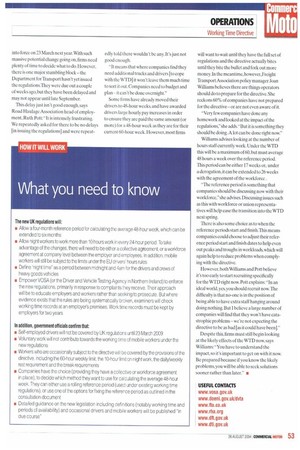TIM NG IS ALL
Page 52

Page 53

If you've noticed an error in this article please click here to report it so we can fix it.
What should you be doing now for the Working Time
Directive? Emma Penny reports.
The Working Time Directive is a source of much anger and frustration within our industry. We're being landed with something which is going to upset the way we work and will increase our running costs. But it's not going to go away.The European Commission has decreed that it must happen, and what it asks for, it usually gets.
Even so, it seems some countries are further ahead than others.A recent CM survey found that some of our European neighbours have done very little, if anything, towards implementing the WTD. But the Eurocrats says they will have to comply, albeit eventually.
Here in the UK we have been talking about the WTD for years — it's finally due to come into force on 23 March next year.With such massive potential change going on,firms need plenty of time to decide what to do. However, there is one major stumbling block the Department for Transport hasn't yet issued the regulations.They were due out a couple of weeks ago, but they have been delayed and may not appear until late September.
This delay just isn't good enough,says Road Haulage Association head of employment, Ruth Pott:" It is intensely frustrating. We repeatedly asked for there lobe no delays [in issuing the regulations] and were repeat edly told there wouldn't be any. It's just not good enough.
"It means that where companies find they need additional trucks and drivers [to cope with the WTD] it won't leave them much time to sort it out. Companies need to budget and plan it can't be done overnight."
Some firms have already moved their drivers to 48-hour weeks, and have awarded drivers large hourly pay increases in order to ensure they are paid the same amount (or more) for a 48-hour week as they are for their current 60-hour week. However, most firms will want to wait until they have the full set of regulations and the directive actually bites until they bite the bullet and fork out more money. In the meantime, however, Freight Transport Association policy manager Joan Williams believes there are things operators should do to prepare for the directive. She reckons 60% of companies have not prepared for the directive or are not even aware of it.
-Very few companies have done any homework and looked at the impact of the regulations," she adds."But it is something they should be doing. A lot can be done right now."
Williams advises looking at the number of hours staff currently work. Under the WTD this will be a maximum of 60, but must average 48 hours a week over the reference period. This period can be either 17 weeks or, under a derogation, it can be extended to 26 weeks with the agreement of the workforce.
"The reference period is something that companies should be discussing now with their workforce," she advises. Discussing issues such as this with workforce or union representatives will help ease the transition into the WTD next spring.
There is also some choice as to when the reference periods start and finish.This means companies could choose to adjust their reference period start and finish dates to help even out peaks and troughs in workloads, which will again help to reduce problems when complying with the directive.
However. both Williams and Pott believe it's too early to start recruiting specifically for the WTD right now. Pott explains: -In an ideal world, yes, you should recruit now. The difficulty is that no-one is in the position of being able to have extra staff hanging around doing nothing. But I believe a large number of companies will find that they won't have catastrophic problems we're not expecting the directive to be as bad [as it could have been]."
Despite this, firms must still begin looking at the likely effects of the WTD now, says Williams: "You have to understand the impact, so it's important to get on with it now. Be prepared because if you know the likely problems, you will be able to seek solutions sooner rather than later." •


























































































































































































